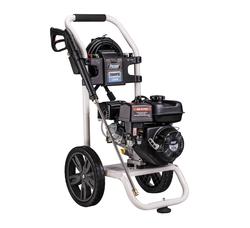- Joined
- Nov 6, 2022
- Messages
- 167
GCV 190 works like a champ. This engine, and it's replacement parts, are ubiquitous.
Don't forget pump saver after each use.
Don't forget pump saver after each use.
Last edited:
I have a similar model with a Chonda engine, but the same pump. Unfortunately, the pump isn’t serviceable, but can be had for $100 or so if needed down the road. The unloader valve is a bit finicky… I might get a Cat pump when this one fails.Well I picked up that Simpson 3300psi for $175 today. Fires up first pull, no leaks, tons more powerful than the electric I have. Seems that pump would be stupid easy to replace if need be down the road.
View attachment 212886
Agreed, I went so far as to zip-tie the trigger on my Simpson so if it's running it's spraying. I just put my foot on the handle while I start the engine. It's a residential unit with the Honda GCV190 and it's been fine for about a decade in typical homeowner use.I have a similar model with a Chonda engine, but the same pump. Unfortunately, the pump isn’t serviceable, but can be had for $100 or so if needed down the road. The unloader valve is a bit finicky… I might get a Cat pump when this one fails.
The key is to not let it excessively idle as that will heat the water inside the pump. Keeping it spraying will ensure constant cold water to keep the pump cool(er). It seems to get very hot compared to the Cat pump on my dad’s pressure washer.
The key is to not let it excessively idle as that will heat the water inside the pump. Keeping it spraying will ensure constant cold water to keep the pump cool(er). It seems to get very hot compared to the Cat pump on my dad’s pressure washer.
Sometimes mine needs the handle open to start too. I’ve actually gone so far as to start it dry then turn the water on. I have a valve at the inlet so it’s not dry for very long.Agreed, I went so far as to zip-tie the trigger on my Simpson so if it's running it's spraying. I just put my foot on the handle while I start the engine. It's a residential unit with the Honda GCV190 and it's been fine for about a decade in typical homeowner use.

